iPad
Apple's 11-inch iPad with Apple Pencil and Magic Keyboard Folio support, starting at $349.
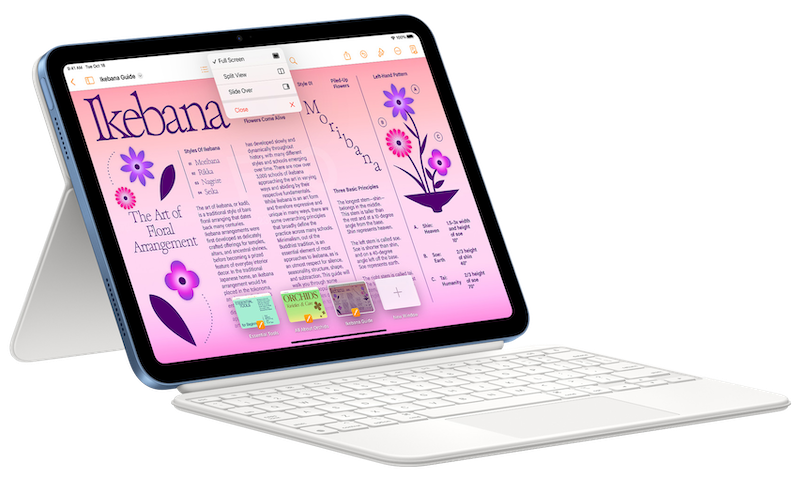
Should You Buy an Entry-Level iPad?
The iPad is Apple's most affordable and most popular tablet. The 11th-generation model includes an A16 chip, a design with flat sides and a range of color options, an 11-inch display, a USB-C port, and more, with prices that start at $349.
Introduced in March 2025, the 11th-generation iPad is at the beginning of its product cycle, which means now is a good time to buy. A new model isn't expected until March 2026 at the earliest.
The iPad is Apple's most inexpensive iPad model for those who want a balance of features and affordability, but users looking for a smaller iPad with better specifications should consider the iPad mini, which starts at $499 and has a faster A17 Pro chip. On the other hand, for an iPad with better specifications, there is the $599 iPad Air, which offers a faster M3 chip, features like Stage Manager, and improved display technologies.
Apple's 2025 iPad
Contents
Apple introduced the latest low-cost iPad in March 2025, adding an upgraded A16 chip, 128GB of starting storage, and a few other minor tweaks, but no major changes or design updates. Unlike many of Apple's other recently updated devices, the iPad 11 does not support Apple Intelligence.
The 11th-generation iPad has the same squared-off all-display design of the iPad mini and iPad Air and it comes in Silver, Blue, Pink, and Yellow. Instead of a Home button, there is a Touch ID Top button of the iPad, and a front-facing camera at the landscape edge of the device for video calls while the iPad is in landscape mode.
The 11th-generation iPad offers an 11-inch Liquid Retina display with a resolution of 2360 by 1640 pixels, 500 nits of brightness, and True Tone technology, but it does not have some of the bells and whistles of other iPad displays such as an anti-reflective coating.
The iPad now features Apple's A16 chip with a 5-core CPU and a 4-core GPU. The A16 chip does not support Apple Intelligence, but it is faster than the prior-generation A14 chip that was in the iPad 10.
The iPad features a 12-megapixel camera with support for 4K video recording and upgraded Smart HDR 4, Wi-Fi 6 support, Bluetooth 5.3, and 5G connectivity on cellular models.
The iPad supports the USB-C Apple Pencil and the the first-generation Apple Pencil with an adapter to charge and pair it. The 11th-generation iPad also works with the Magic Keyboard Folio, which offers full-size keys with 1 mm of travel, a multi-touch trackpad, a function row, a two-piece design, and a kickstand back cover.
The iPad starts at $349 for 128GB of storage and is available for preorder from the Apple online store and Apple retail stores. The original Apple Pencil is available separately for $99, as is the USB-C Apple Pencil, priced at $79. The Magic Keyboard Folio is sold separately too for $249.
Note: See an error in this roundup or want to offer feedback? Send us an email here.
How to Buy
The 11-inch 11th-generation iPad can be ordered from the online Apple Store and the retailers starting at $349.
Design
With the launch of the 10th-generation iPad, Apple overhauled the design, introducing a look similar to the iPad Pro and the iPad Air with an all-display design and no Home button, and there have been no changes to that design with the 11th-generation iPad.
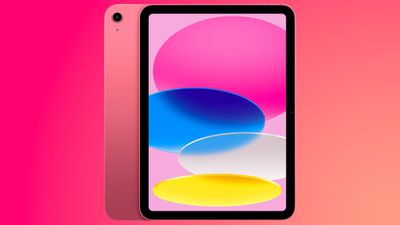
There is an edge-to-edge display with slim bezels and an aluminum chassis with flat, rounded edges, much like the iPad Air. The iPad 11 comes in four colors, including blue, pink, silver, and yellow.
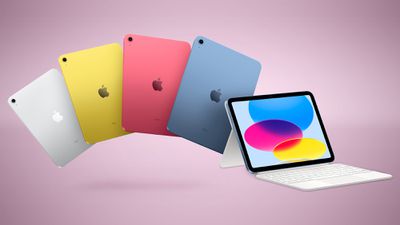
The iPad measures in at 9.79 inches (248.6 mm) long, 7.07 inches (179.5 mm) wide, and 0.28 inches (7 mm) thick. It is just a bit bigger than the iPad Air, but a good deal thicker than its 6.1-mm sibling. It weighs in at 1.05 pounds (477 grams) with cellular models weighing just a few grams more.
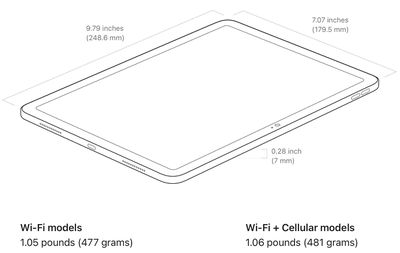
Though there is an all-display design, the iPad does not use Face ID. Like the iPad Air and the iPad mini, it has a Touch ID fingerprint sensor built into the power button. The fingerprint sensor scans the finger much like a Touch ID Home button, but it is smaller and more compact. Touch ID can be used to unlock the iPad, access apps, make purchases with Apple Pay, and more.
There is a single-lens camera at the back of the iPad, a front-facing camera on the right side of the front, along with speakers at the top and bottom, a microphone at the back, volume up and down buttons at the side, a USB-C port for charging, and a Smart Connector along the side edge for accessories.
Display
The iPad has an 11-inch Retina LED display with a resolution of 2360 x 1640 at 264 pixels per inch. It is the least advanced display compared to the iPad Pro, iPad Air, and iPad mini models, which is how Apple keeps the iPad affordable.
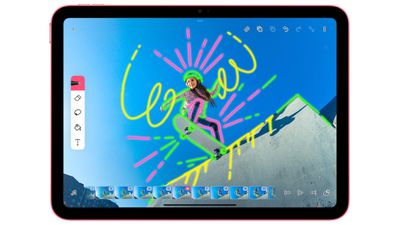
Note that Apple says the iPad 11 has an 11-inch display while the iPad 10 had a 10.9-inch display, but the display has not changed at all, and the difference comes from the way that Apple has decided to round the display size.
The display features 500 nits of brightness, and it supports True Tone. True Tone allows the temperature of the display to change to be warmer or cooler, matching the lighting in the room that you're in so there's not a stark difference between the color of the display and the ambient light.
The display is also equipped with a touch sensor that allows it to work with the Apple Pencil, and it has a fingerprint-resistant oleophobic coating.
A16 Chip
The iPad is equipped with an A16 chip that was first used in the iPhone 14 Pro models, but it is worth noting that the A16 chip in the iPad 11 has a 5-core CPU, 4-core GPU, and a 16-core Neural Engine.
The A16 chip is up to 30 percent faster than the A14 Bionic chip from the prior-generation iPad. Apple says that the A16 is up to 6x faster than the best-selling Android tablet.
As the iPad has an A16 and not an A17 Pro or better, it does not support Apple Intelligence. The A16 is capable of running Final Cut Pro for iPad, though, and it is an affordable way to access professional video editing capabilities.
Storage
The iPad starts with 128GB of storage, a new minimum in 2025. There are also 256GB and 512GB upgrade options, and the 512GB option is new this year.
RAM
The iPad 11 has 6GB RAM, up from 4GB in the prior-generation model.
Battery Life
The iPad is equipped with a 28.6-watt-hour lithium-polymer battery, and it continues to offer up to 10 hours of battery life when surfing the web or watching video.
Rear Camera
The iPad 11 uses a 12-megapixel Wide camera, which is the same camera that's in the iPad Air. It has an ƒ/1.8 aperture, Smart HDR 4 support, Burst mode, Live Photos with stabilization, autofocus with Focus Pixels, wide color capture, exposure control, auto image stabilization, noise reduction, and more.
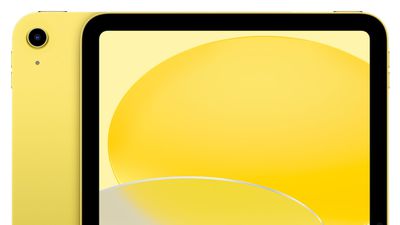
4K video recording is supported at 20, 30, or 60 frames per second, as is slo-mo video at 120 or 240 frames per second. The iPad can also record in 1080p at 30 or 60 frames per second, and it supports continuous autofocus, cinematic video stabilization, and the option to take 8-megapixel still photos when recording 4K video.
FaceTime Camera
Though there's no TrueDepth camera system to support Face ID in the iPad Air, there is a 12-megapixel Ultra Wide front facing camera with a 122 degree field of view and an ƒ/2.4 aperture. The camera supports Center Stage, designed to keep users perfectly framed on screen during video calls. With the wider field of view, the camera can zoom in as appropriate and follow people around the room as they move.

When other people join in on a call, the camera is able to detect them, and it zooms out to fit everyone into the view. Center Stage is designed for FaceTime, but it also works with third-party video apps like Zoom and Skype.
The camera is positioned on the side of the iPad so that it is upright when in a landscape orientation, similar to the camera on a MacBook. This is the first time that Apple has used this particular camera orientation.
Other Features
5G
Cellular models of the 11th-generation iPad have a 5G chip that allows them to connect to 5G networks, but it does not support the fastest mmWave 5G networks and is limited to the slower but more widespread Sub-6GHz networks.
mmWave 5G networks are the fastest 5G networks, but mmWave is short-range and can be obscured by buildings, trees, and other obstacles, so its use is limited to major cities and urban areas along with venues like stadiums, arenas, airports, and other places where a lot of people congregate. Sub-6GHz 5G is much more widely available and available in urban, suburban, and rural areas across the United States and other countries.
The prior-generation iPad 10 supported eSIM and had a physical SIM slot, but the new iPad 11 only has eSIM for selecting a cellular network.
Wi-Fi, Bluetooth, and Sensors
The iPad supports 802.11ax Wi-Fi 6 and Bluetooth 5.3. The iPad includes a three-axis gyro, an accelerometer, an ambient light sensor, and a barometer.
USB-C Port
The iPad is equipped with a USB-C charging port. The USB-C port in the 11th-generation iPad is slower than the USB-C port available in the iPad Pro, iPad Air, and iPad mini models. It is limited to USB 2.0 speeds of up to 480Mb/s for data transfer.
Accessories
Apple Pencil
The iPad is compatible with both the $99 original Apple Pencil and the $79 USB-C Apple Pencil that Apple announced in October 2023.

The Apple Pencil is a stylus that's designed to offer unparalleled precision and integration with the iPad while also offering a natural feel that's similar to the sensation of using a pen or pencil on paper.
There are pressure and positioning sensors built into the original Apple Pencil to allow it to detect a range of forces for pressure-sensitive drawing and writing, but this feature is not available in the USB-C Apple Pencil. Two tilt sensors in the tip of the Apple Pencil determine the orientation and angle of the hand holding it, enabling shading techniques.
The Apple Pencil offers a 12-hour battery life and it charges through the built-in Lightning connector at the bottom of the device. A 15-second charge delivers a half-hour of power, so it's always going to have juice when needed.
Because the first-generation Apple Pencil charges using an integrated Lightning connector, to charge it with the iPad, a Lightning to USB-C adapter is required. The USB-C Apple Pencil has a hidden USB-C port so it needs a USB-C cable to charge.
Magic Keyboard
Apple sells a $249 Magic Keyboard Folio alongside the iPad, with the accessory able to turn the iPad into a mini notebook. It is a full-size keyboard with a built-in trackpad and a 14-key function row.
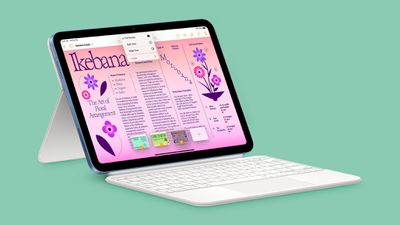
The keyboard features two pieces, so a cover and kickstand can be used separately from the detachable keyboard. Both pieces magnetically attach to the iPad.
What's Next for the iPad
Apple is working on a next-generation low-cost iPad with an updated chip, and it is expected to come out in early 2026.
The next-generation iPad will have an A18 chip, according to leaked Apple code. The A18 is the chip that Apple debuted in the iPhone 16.

